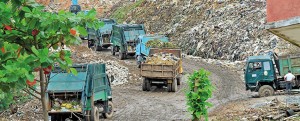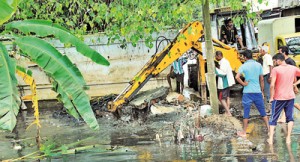News
In Meethotamulla, the suffering just gets worse
The Meethotamulla garbage dump, long an ecological problem and eyesore in Colombo, has caused more misery to nearby residents because of the floods. People returning to their homes found garbage-laden water had flowed inside, leaving most of their possessions unusable.

More lorries full of garbage yesterday heading towards the towering mountain
L. Asanka, a resident of Kelani Tissa Gama, at Weragodella, Sedawatte, said that he and around 53 families live in the vicinity of the dump. “The situation was worse with the recent flooding”, he said. The stench was unbearable, mosquitoes were breeding and life was intolerable. The children and the babies were the worst hit.
“The future is bleak for us. Sooner or later the garbage will reach roof level,” he said.“We were soaked in sewage-infested water while wading through these waters to collect our belongings,” 52-year-old M. Kanchana said. “We constantly suffer from poor health conditions caused by the garbage dump. Most residents have contagious diseases. Almost all the children suffer from asthmatic conditions,” a resident of Meethotamulla, 34-year-old Sagara Peris, said.

People returning to their homes found garbage-laden water in the premises of their homes. Pix by Indika Handuwala
The authorities had laid soil over the garbage in an effort to reduce the smell emanating from the dump but, she said, this had resulted in dust covering the whole neighbourhood. Ms Peris also complained that people who collected plastic and glass for recycling burned unwanted items in the area using tyres, increasing air pollution. The discharge of black smoke made breathing very difficult.
No government official has visited the area to offer help over the floods, the residents claimed, saying they had received most of their food and medicine supplies from a monk at a nearby temple.
Health officials fear the current system of garbage disposal could result in serious pollution problems and the outbreak of disease.
“If garbage dumps are not covered with layers of soil, it could lead to the spread of infection even to areas far from the dump,” according to CMC chief medical officer Dr. Ruwan Wijeyamuni. “The pollution would continue for more than 15 years.”
Dr. Wijemuni said containers and plastic bags were common breeding spots for mosquitoes and that all the recent dengue-related deaths had been reported from Modera and Mattakkuliya, which were close to garbage dumps.
Leptospirosis (rat fever), hepatitis and water-borne diseases are some of the diseases found in neighbourhoods where there are garbage dumps, while elderly persons and children suffer from asthmatic conditions. “The air in these areas is highly polluted, and inflammable methane gas forming over the dumps could result in an explosion,” he said.
The Ministry of Health insisted that their officers and Public Health Inspectors (PHIs) were distributing as much disinfectants and drugs as residents requested. “If they have not yet received supplies they must request them from their local PHI or Grama Niladhari,” Health Services Deputy Director General of Public Health, Dr. Sarath Amunugama said.
Dr. Amunugama also said that to avoid an outbreak of rat fever, Health Services officers were distributing doses of doxycycline to the people ahd had conducted many educational programmes to inform people of possible health risks at this time.

